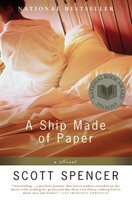
There's a moment fairly late in the book, when events and characters come to an unexpected, and shocking denouement—I remember this passage clearly, I was reading it on the metro, and I gasped out loud (startling the other metro riders). Such are the problems of reading characters that leap out of the pages with such intensity and power that the world around you disappears.
In a small, mostly white town of Leyden, New York, Daniel Emerson—who is himself involved in a serious relationship—is fiercely in love with another woman—a married, black woman named Iris Davenport. After a series of richly detailed, exquisitely written chapters, the two eventually have an affair whose consequences fracture both their lives. There’s nothing really special about this story when laid out in this way, but I am reluctant to say much more. So much of the joy in reading this book, is in discovering each new twist, and waiting for the inevitable which arrives in startling, unpreditable waves.
Deftly and elegantly, Spencer unpacks the racial and sexual implications of the relationship between Daniel and Iris in deliciously ambiguous ways. There’s a beautiful passage early on that describes Daniel’s torture when he imagines telling Iris that he moved back to Leyden from New York City because he has developed a fear of black people (due to being beaten up by a few). Similarly, Daniel’s girlfriend (practically wife), Kate Ellis's privilege and often brash intolerance makes for some beautifully uncomfortable racially-tinted moments.
There’s also Hampton, Iris’s husband—a highly successful investment banker—a man whose racial pride and self-regard is so potent, so over-powering that little else matters when he enters the scene. Here’s a passage that describes Hampton’s reaction to a letter in which there’s an implied slight made against his wife, Iris, who has been taking years to finish up her doctoral studies.
Yet. His heart feels queer, as if it is suddenly circulating blood that is a little oily and a little cold. Hampton is vulnerable to the suggestion that Iris might not be in possession of a first-class mind. There is a vagueness to her, a lack of precision. Sometimes, he thinks this is a result of her profoundly feminine nature, yet in his line of work he meets dozens of women whose minds are scientific, logical, calculating, aggressive. Iris’s is not. Both she and Hampton have been explaining her long career in graduate school to themselves and to the world at large as somehow a result of an excess of intellectual curiosity, an unwillingness to be pigeon-holed, and the demands of motherhood, and Hampton is perfectly willing to stay within the confines of this official explanation. What he is not willing to say, except to himself…[is that..] because she is simply too confused to complete her work; that, in other words, the machinery of her mind is not quite up to the task.
In a lot of ways, Ship Made of Paper manages to do what movies like Crash only make half-baked attempts at—relate racial ambiguities without resorting to high-minded, yet cheap messaging and condescension. Instead, it offers up it's racially potent world in startlingly imaginative and sensitive ways.



2 Comments:
Hey Sony - thanks for the recommendation! I enjoyed reading the book but I have to say I still side with "Crash." It's difficult because they tackle slightly different aspects of the race issue. While A Ship Made of Paper focuses intently on the black/white love/hate relationship over a period of about 1 year in a small town, Crash zooms in on a 24-hour glimpse of how multiple racial groups can collide, intertwine, and sustain each other in urban Los Angeles. I find it difficult to compare the vehicles - the formats of the novel vs. the 2-hour film. I think both are impressive in the artful delivery of their respective messages and would rather not compare them:) I'm just glad that novelists, filmmakers and other artists are willing to tackle the issue at all with such warm reception from 'authoritative' bodies like the National Book Award and the Academy Awards.
Hey Clairebear:) (I think, either you or my roomie:)
I liked Crash actually, it was really fun to watch and I was entertained. But the problem I had with Crash can be most clearly stated by someone else. In this case, the always "right-on" AV-Club (see below). (by the way my brother thinks that every other movie is about race; my brother is insisting on commenting on every sentence I type...hmmm..) What I loved about Ship made of paper (outside of the phenomenal writing and rich characters), is that Spencer never resorts to cliches or predictable, clumsy messaging. (I don't know how far you might be...but spoiler ahead) : I love the part when Daniel realizes that he hasn't confronted Hamptom about Iris because he is afraid of Hampton. Daniel's fear of black people and his subsequent overly-compensating liberal heart-wrenching is just as annoying as Katie's shrill racist proclamations. That's what spencer does so well, that Crash fails at. Spencer shows us ways in which white priveldge and race relations often go hand in hand, and as readers, we are constantly shifting our alliances and choosing sides we wouldn't expect to. Crash, on the other hand, merely offers simplified truisms, which while provocative, isn't particularly novel or genuine. "Racists can be good people too", thanks Crash!
And while I agree that they are two entirely different mediums and artforms, Ship Made of Paper reminded me of Crash for what they both attempt to do (which, in my opinion, Ship does much better)..which is illustrate how complicated, and ambigous race relations can be/are.
From AV: It's rare enough for an American movie to even acknowledge the race problem, and it's rarer still for one to be constructed entirely out of the torn fabric of race relations. But is this really the movie Andersen had in mind? For all its daring and intermittent power, Crash seems destined to join other films like Gentleman's Agreement, Guess Who's Coming To Dinner, and Grand Canyon among well-intentioned social dramas in which message becomes reality. Note the standard closing-credits disclaimer: Any relation to persons living or dead is purely coincidental. Two basic things drive the action in every scene of Crash: assumption and redemption. Sometimes the assumption comes from a character, sometimes from the audience, but it inevitably results in a complete (and increasingly predictable) reversal of expectations. That leads to the redemption part, when previously despicable bigots display deep reserves of courage and compassion. Haggis, who wrote the fine adapted screenplay for Million Dollar Baby, embeds Crash's script so deeply in allegory that every revelation feels manipulative and programmatic, in spite of some terrific individual scenes and performances. Just because a movie is about racial politics doesn't mean that they should dictate it.
Post a Comment
<< Home